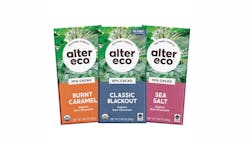Alter Eco® Reveals New Packaging Design
Source Alter Eco
The sustainable chocolate trailblazer asserts its vision to transform global cacao supply chain by committing to regenerative agriculture with new charitable foundation.
SAN FRANCISCO--(BUSINESS WIRE)--Alter Eco®, a sustainable chocolate-centric food company that helps mitigate climate change through regenerative agriculture, today announced two new ways it will strengthen its commitment to cacao cultivation that has a positive impact on the planet. As the new charitable arm of the company, the Alter Eco Foundation will work directly with cacao farmers to help them transition their crops to regenerative agriculture, a next-generation approach to farming that is already showing significant potential to reduce greenhouse gas emissions. Alter Eco also introduced new packaging for its entire line of organic and Fair Trade chocolate bars that showcases the company’s commitment to regenerative agriculture.
The new packaging features a photo taken at one of the co-ops where cocoa used in Alter Eco products is grown. It shows a form of regenerative agriculture called “dynamic agroforestry.” In this model, farmers plant diverse crops (up to 15 species per acre) next to cocoa plants in order to mimic a natural, self-sustaining ecosystem. The natural ecosystem improves cocoa plant health, soil health, farmer working conditions, and farmer income diversification. It also increases biodiversity and sequesters carbon, potentially reversing climate change. The photo of a banana tree sheltering a cacao plant illustrates how the agroforestry ecosystem reduces reliance on artificial fertilizers and irrigation. Banana tree trunks are naturally filled with water and nutrients, so farmers use them in lieu of man-made irrigation and fertilizer to provide natural water and nutrients to the cocoa plants.
“During a visit to Ecuador last year, I saw some farmers setting up drip lines to irrigate their crops,” said Mike Forbes, CEO of Alter Eco. “Ecuador’s natural environment is a rainforest, so that type of irrigation should not be necessary to grow food. To me, this was a clear sign that the conventional farming methods used to grow our food are broken and it’s going to take a systematic approach to repair it. It’s part of our responsibility as a food company to help instigate this change.”
The mission of the newly established Alter Eco Foundation is to make the company’s agroforestry model available to the entire cacao industry, expediting adoption within global supply chains through advocacy and education. According to data from the Environmental Protection Agency (EPA), 24 percent of global greenhouse gas emissions can be attributed to agriculture and forestry. If current conventional agricultural practices do not change soon, the UN estimates that most healthy soil will disappear within 60 years. Per Antoine Ambert, Managing Director of Alter Eco Foundation, “Alter Eco’s regenerative cacao is estimated to increase carbon sequestration by 83 metric tons of CO2 per acre over 20 years*, in comparison to conventional monoculture cacao. These numbers show that at scale, about 2.5 gigatons of CO2 would be sequestered from the atmosphere over 20 years if the global cocoa industry transitioned its approximately 30 million acres to our dynamic agroforestry model.”
Four hundred of the 1,800 co-op farmers Alter Eco sources cacao from in Ecuador have already transitioned some of their parcels to the dynamic agroforestry model. With $1.5 million already committed, the Alter Eco Foundation will help transition cacao farmers in its supply chain and beyond – starting with the remaining 1,400 in Ecuador – while driving awareness and education about the practice globally.
The Alter Eco Foundation assembles an impressive group of regenerative agriculture and cocoa thought leaders and practitioners, including Altair Rodriguez (cocoa farmer and advocate), Alexis Sutton (Erol Foundation), Carla Martin (Fine Cacao & Chocolate Institute, Harvard lecturer), Gero Leson (Dr. Bronner’s), and Larry Kopald and Tom Newmark (Carbon Underground). The Erol Foundation, a partner of NextWorld dedicated to funding environmental and social justice projects globally, has committed multi-year funding to launch and establish the Alter Eco Foundation in its first few years of operation.
To learn more about Alter Eco’s commitment to sustainability, the Alter Eco Foundation, and how you can take action, please visit alterecofoundation.org. Alter Eco’s new chocolate bar packaging is available online at www.alterecofoods.com and is on its way to stores nationwide.
About Alter Eco®
Alter Eco® is a chocolate-centric food company that helps mitigate climate change through regenerative agriculture and carbon sequestration. Recognized as a top certified Benefit Corporation, a registered Public Benefit Corporation and proudly listed as one of the ‘Best & Brightest’ places to work in 2019, Alter Eco is dedicated to pioneering a better way of doing business as a force for change. The company practices a full-circle approach to sustainability throughout its operations and supply chain through four pillars: sourcing using Fair Trade principles, producing only organic and non-GMO foods with regenerative farming practices, creating minimal waste by working towards 100 percent compostable packaging, and in-setting carbon emissions by means of large-scale reforestation/conservation programs in the cooperatives that produce its crops. These principals are entwined with Alter Eco’s commitment to the highest quality ingredients and taste in all of its products, available in North America, Australia and Canada. All Alter Eco products are USDA Certified Organic, Fair Trade Certified, Climate Neutral Certified, non-GMO and Certified Gluten-Free (excluding Dark Salt & Malt). For more information about Alter Eco, please visit www.alterecofoods.com.
*Jadán, Oswaldo, Miguel Cifuentes, Bolier Torres, Daniela Selesi, Darío Veintimilla, and Sven Günter. Influence of Tree Cover on Diversity, Carbon Sequestration and Productivity of Cocoa Systems in the Ecuadorian Amazon. - “Converting cocoa monoculture to cocoa AFS [agroforestry systems] would increase stocks by about 56 Mg C/ha (table II) or 206 Mg CO2e/ha of C stored and 3 Mg C/ha/yr or 11 Mg CO2e/ha/yr of C fixed.” (page 45)






